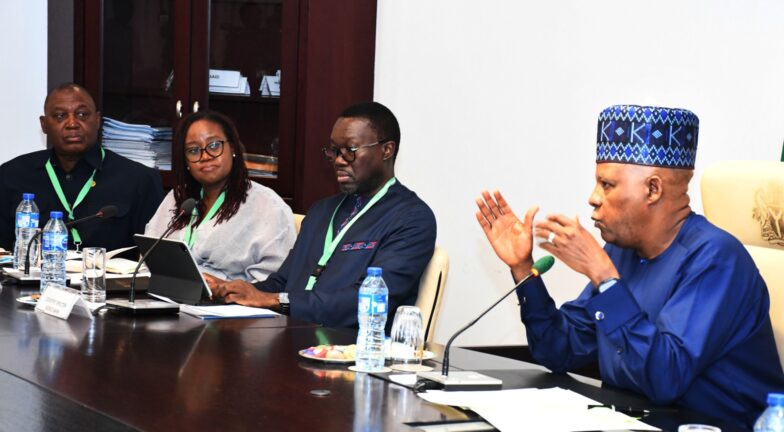News Investigators/ The Vice President, Kashim Shettima, says investing in nutrition offers one of the highest returns on investment for any development intervention, with every dollar yielding an estimated return of 23 dollars.
Mr Shettima said this on Thursday in Abuja at a conference on Mobilising Against Malnutrition in Northwest Nigeria, organised by the Katsina State Government, Northwest Governors Forum, and Médecins Sans Frontières (MSF).
He was represented by Mrs Uju Rochas-Anwukah, Senior Special Assistant to the President on Public Health and Focal Person on Nutrition in the Office of the Vice President.
According to him, investing in nutrition means investing in human capital — the next generation and future leaders who will drive Nigeria’s growth and development.
Mr Shettima lamented that thousands of children and pregnant women die each year from malnutrition-related causes, while millions more are left physically and mentally impaired.
“Beyond the human tragedy lies the economic one. An estimated 56 billion dollars is lost in human capital annually, equivalent to 12.2 per cent of our national income.
“These figures represent lost potential and a cycle of poverty that undermines development. But our task today is not to despair, it is to act decisively,” he added.
The vice president stressed that solutions to malnutrition were neither mysterious nor unattainable, describing them as evidence-based, cost-effective, and proven to save lives when properly implemented.
He said that treating malnourished children saved lives, while prevention helped them to grow, learn, and thrive.
“No child can learn on an empty stomach. Nutrition must be viewed as an investment, not a cost,” he said.
The Katsina State Governor, Diko Radda, reaffirmed his administration’s commitment to addressing the root causes of malnutrition, saying northwest governors were pursuing major reforms across multiple sectors.
“Katsina has contributed N1 billion to the Child Nutrition Fund, with UNICEF providing matching funds of N200 million, N300 million, and N500 million in 2023, 2024, and 2025 respectively,” Radda said.
He said the state government was scaling up and modernising Outpatient Therapeutic Programmes (OTPs), stabilisation centres, and local production of Ready-to-Use Therapeutic Food (RUTF).
“This will guarantee a consistent supply, stimulate the local economy, and create jobs for our youths. We are also considering six months of maternity leave for better infant care,” he added.
Mr Radda urged participants to make actionable commitments to tackle hunger and malnutrition as a top sustainable development priority in Nigeria.
The Coordinating Minister of Health and Social Welfare, Muhammad Pate, described malnutrition as one of Nigeria’s most pressing challenges, particularly in the northwest where many families struggled to access adequate food.
Represented by the ministry’s Director of Nutrition, Mrs Ladidi Bako-Aiyegbusi, Pate cited the 2024 Nigeria Demographic and Health Survey (NDHS), which reported persistently high rates of wasting and stunting across several states.
“While humanitarian interventions have reduced some impacts, the underlying causes, poverty, food insecurity, weak health systems, and low preventive services, will persist unless urgent action is taken,” he warned.
Prof. Pate said the Federal Government had scaled up preventive and treatment measures, establishing 115 additional malnutrition treatment sites nationwide between Jan. and Nov. 2025.
“Government alone cannot solve this challenge. Addressing malnutrition requires coordinated action from states, donors, and implementing partners. Everyone has a role to play,” he added.
MSF Country Representative, Ahmed Aldikhari, said Nigeria remained the country where the organisation treated the highest number of children with acute malnutrition globally.
“In 2024 alone, nearly 300,000 children with Severe Acute Malnutrition were admitted into our outpatient units across northern Nigeria, accounting for over half of MSF’s global admissions,” he said.
He said the scale of malnutrition reflected both the severity of the crisis in Nigeria’s Sahelian belt and the country’s large population.
Mr Aldikhari commended federal and state governments for ongoing efforts but called for stronger collaboration and additional partner support to match the urgency of the situation.
“We are here because we share a deep concern for the well-being of families and children across northwest Nigeria.
“This conference is a platform to strengthen partnerships and renew commitments,” he said.
The conference brought together government representatives, development partners, civil society groups, the private sector, and philanthropies to align strategies, mobilise resources, and translate shared commitments into concrete action.
NAN
